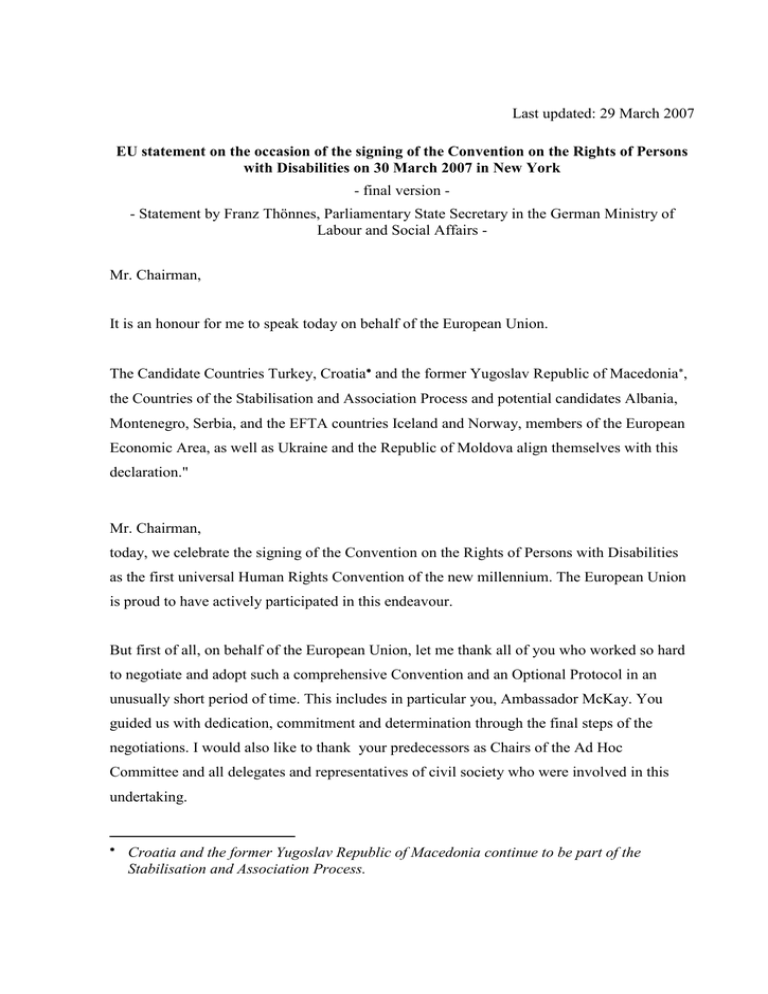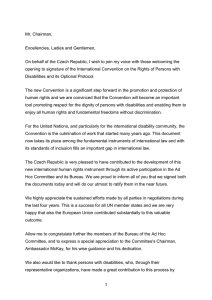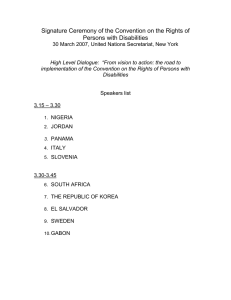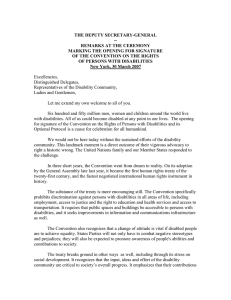European Union
advertisement

Last updated: 29 March 2007 EU statement on the occasion of the signing of the Convention on the Rights of Persons with Disabilities on 30 March 2007 in New York - final version - Statement by Franz Thönnes, Parliamentary State Secretary in the German Ministry of Labour and Social Affairs Mr. Chairman, It is an honour for me to speak today on behalf of the European Union. The Candidate Countries Turkey, Croatia and the former Yugoslav Republic of Macedonia, the Countries of the Stabilisation and Association Process and potential candidates Albania, Montenegro, Serbia, and the EFTA countries Iceland and Norway, members of the European Economic Area, as well as Ukraine and the Republic of Moldova align themselves with this declaration." Mr. Chairman, today, we celebrate the signing of the Convention on the Rights of Persons with Disabilities as the first universal Human Rights Convention of the new millennium. The European Union is proud to have actively participated in this endeavour. But first of all, on behalf of the European Union, let me thank all of you who worked so hard to negotiate and adopt such a comprehensive Convention and an Optional Protocol in an unusually short period of time. This includes in particular you, Ambassador McKay. You guided us with dedication, commitment and determination through the final steps of the negotiations. I would also like to thank your predecessors as Chairs of the Ad Hoc Committee and all delegates and representatives of civil society who were involved in this undertaking. Croatia and the former Yugoslav Republic of Macedonia continue to be part of the Stabilisation and Association Process. -2- The EU pays special tribute to the organizations of persons with disabilities. Your commitment and expertise have proven indispensable during the entire process. We hope you will continue to provide us with your support and valuable input. The guiding principle of this unique cooperation -“Nothing about us without us” - will be equally valid at national level as it was here at the United Nations. The European Union is also pleased to announce that, along with many member states, the European Community signed the Convention in its own right today. This was the first signing of a core human rights treaty by the European Community and can therefore be seen as a historic step. Mr. Chairman, The Convention will benefit 650 million persons with disabilities around the world. We must now ensure its effective implementation so that persons with disabilities can fully enjoy all human rights and fundamental freedoms on an equal basis with others. The first step towards implementation of the Convention will be its entry into force upon the twentieth ratification. The EU encourages all States to sign and to ratify the Convention as soon as possible. It is also our hope that the ratification process will once again generate public debate about this important human rights instrument in each of the signatory states. It is only through public awareness and attention and the active involvement of civil society, including persons with disabilities, that the Convention can live up to its full potential. Mr. Chairman, The Convention does not establish any new rights but rather emphasizes and consolidates the existing rights and freedoms of persons with disabilities and the international commitments of States. The Convention defines disability as an element of human diversity and praises the contributions of persons with disabilities to society. It prohibits obstacles to the participation and promotes the activeinclusion of persons with disabilities in society. The long-term goal of this Convention is to change the way the public perceives persons with disabilities, thus ultimately changing society as a whole. This is a challenging task that truly only starts today and will require our full determination. -3- 2007 is also the European Year of Equal Opportunities for All. In this context, the European Union intends to play an active part in the process leading to the implementation of the Convention. In June 2007, the German EU Presidency will host an international conference in Berlin. With this conference, we want to muster support for the Convention and to raise public awareness for the rights of persons with disabilities. It sets out to help include persons with disabilities better into the education system and into the open labour market and to promote equal opportunities for all. At the conference, EU Ministers will also discuss the political implementation of the Convention at the European as well as at the Member State level. Mr. Chairman, The European Union is firmly convinced that, by guaranteeing the full enjoyment by persons with disabilities of all human rights and fundamental freedoms, we are also making an important contribution for the better of society as a whole. The European Union therefore hopes that the Convention will enter into force soon and calls once again upon all States to join the Convention as quickly as possible. Thank you.



